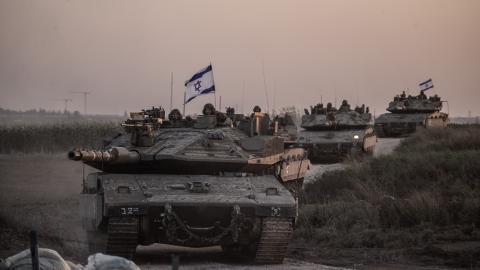The unprecedented scope and scale of the October 7 terrorist attack on Israel has elicited a largely unprecedented Israeli and international response. To understand the aftermath of the Hamas-led invasion of Israel, it is useful to think of a three-part timeline, and best to consider the first and third phases before turning to the second.
The first phase, which is almost over, is one of shock and immediate responses. In Israel, it has included hunting down the invaders, treating the wounded, accounting for the missing, declaring war, launching airstrikes on terrorist targets in Gaza, mobilizing the reserves, preparing the public for the difficult weeks and months ahead, and forming an emergency unity government. In the United States, Europe, and elsewhere, phase one has featured strong declarations of sympathy and support from political leaders, offers of assistance for Israel, and condemnation of the Palestinian murderers, kidnappers, and rapists. This first phase is hot, raw, and emotional. For those with even the barest minimum of human empathy, it is also the easiest to get right.
President Joe Biden, who is both outraged about last Saturday’s atrocities and empathetic to the Jewish state, deserves full credit for responding precisely as the situation requires. From day one, the president, his secretary of defense, Lloyd Austin, and (after some fleeting initial missteps) his secretary of state, Antony Blinken, have said and done all the right things. The first planeload of American military supplies already landed at an air base in the Negev on October 10, with more on the way. Freshly but permanently scarred by their losses and their feelings of vulnerability and solitude, Israelis across the political spectrum have expressed their deep gratitude to the president for his powerful words of support and commitment that same day. Longtime observers of U.S.-Israel relations correctly pointed to Biden’s speech as exceptionally heartfelt, resolute, and practical.
Before considering the second phase, a few words are in order about the third, which may not begin for several months. Once the immediate crisis has passed, the public and the press will ask difficult questions, and often receive outrageous or infuriating answers about how this catastrophe could have happened. This reckoning must be pursued in a way that is dispassionate, systematic, and thorough. Israelis will demand an official commission of inquiry, akin to the Agranat Commission that in November 1973—just weeks after the ceasefire—began its investigation of the disastrous lapses leading up to the Yom Kippur War. Given the widespread intelligence, operational, and policymaking failures on and before October 7, it is likely that the Israel Defense Forces (IDF) General Staff will look quite different six months or a year from now. Israel’s political landscape could change dramatically as well.
The United States, Israel, the Arab countries, and the rest of the world would benefit from a similar process of introspection in Washington, as years of American policy in the Middle East undoubtedly helped set the political stage and provide the resources for the onslaught from Gaza. Meanwhile, the White House’s May 2023 strategy to counter domestic anti-Semitism notably glossed over the Islamist anti-Semitism that animates Hamas, Islamic Jihad, and their fellow travelers. Vocal self-criticism is counterintuitive to most politicians, and all the more so in a contentious election year, but the U.S. policies and practices that preceded October 7 will be the subject of scrutiny and debate for many years to come.
Between the first and third phases is the one that arguably will be the most intense, the most important, and the most difficult. This is when fateful decisions will be made and carried out—or not carried out, as the case may be—and when Israel and the United States will emerge either victorious or defeated.
Prime Minister Benjamin Netanyahu made clear immediately that this conflict differs from its recent predecessors. “Citizens of Israel,” he announced, “we are at war. Not an operation, not a round [of fighting], at war.” Israel has publicized at least some of its war aims, including the termination of Hamas rule in Gaza and the destruction of its leadership, which ultimately will set the bar for success or failure. As of this writing, it appears that the entry of IDF ground forces is imminent and will be necessary to try to locate and rescue the hostages and to destroy Hamas’s, Islamic Jihad’s, and other groups’ installations, capabilities, and personnel that so far have eluded or survived attacks from the air.
Meeting Israel’s war aims is likely to cost the country the lives of many hundreds or more of its most talented and dedicated sons and daughters. It will be even more deadly and destructive for Gazans. And it will take long weeks and months. Already last week, news sites posted the sickening “scoreboards” that accompanied previous conflicts, to keep a running tally of Israeli and Palestinian fatalities. Graphic, gruesome images of the dead and dismembered, mercifully absent from early mainstream reporting from Kfar Aza and Re’im, will appear relentlessly and unfiltered from the broken streets and structures of Khan Yunis and Gaza City. As Israeli forces press ahead, and as the desperation of the terrorist groups’ leadership grows, so will the manifest suffering of the Palestinian population among whom they have illegally and cruelly secreted themselves. Increasing in parallel will be the diplomatic and public pressure on Israel to hold its fire, to pull back, to stop.
It is precisely at that point, the peak of the second phase—when Israel’s need to meet its war aims and the pressure on Israel to stop pursuing them will be most acute—that Jerusalem will need support from Washington most urgently. This will prove to be the greatest test of the commitment President Biden pledged last week. Backing Israel then will be far more difficult than it was when most of the free world joined the United States in expressing its revulsion, but the bulk of the bloodshed was still to come. The question before President Biden will be whether he will support or pressure Israel at that decisive hour and in the face of opposition from within his party and from abroad.
Ending the war before meeting its goals would be a strategic failure not only for Israel, but also for the United States and its partners and allies in the ongoing, region-wide war with Iran and its terrorist proxies. Israel will appear beaten and weak, which will invite further challenges to its borders, its beaches, and its airspace, and inevitably bring about more carnage. The implications for war and peace in the years ahead could not be more profound. The Abraham Accords, to say nothing of a possible peace with Saudi Arabia, were built on the bedrock of a strong Israel and a strong U.S.-Israel alliance. A defeated Israel, and its American ally, would find themselves increasingly attacked and alone, chasing partners who are seeking to hedge their bets by reaching out to Tehran, Moscow, and Beijing.
If Biden nevertheless steps back, the question before Israel’s leaders will be whether they can withstand pressure from their country’s greatest ally, and specifically from the same president whose warm words of friendship they rightly and enthusiastically welcomed last week. They could find that the cost of strong American support for the start of the war is a weakened ability to end it on the terms necessary to achieve victory and to make the next war less likely.
Around the world, people of goodwill who understand what is at stake should make clear to their leaders that until Israel has fulfilled its objectives, trying to hold it back is unacceptable. Allowing Hamas and its Iranian sponsors to escape unambiguous defeat would be morally and strategically wrong, with catastrophic results that would extend well beyond Israel’s battered borders and for years to come.


















